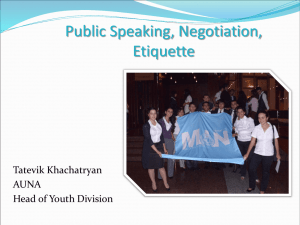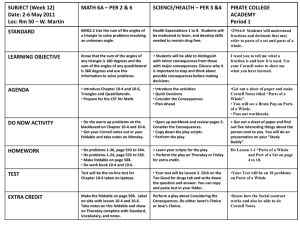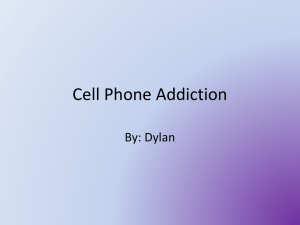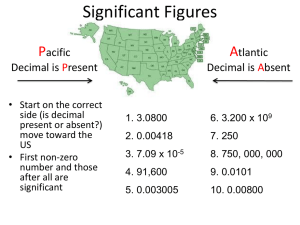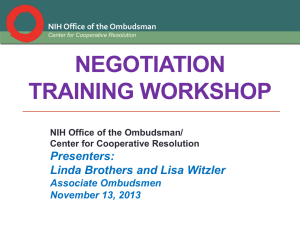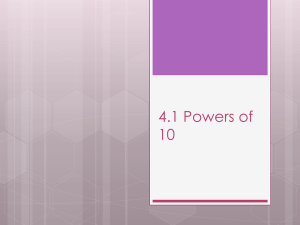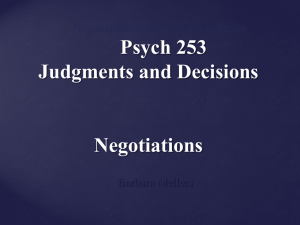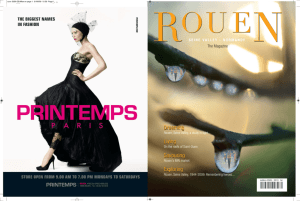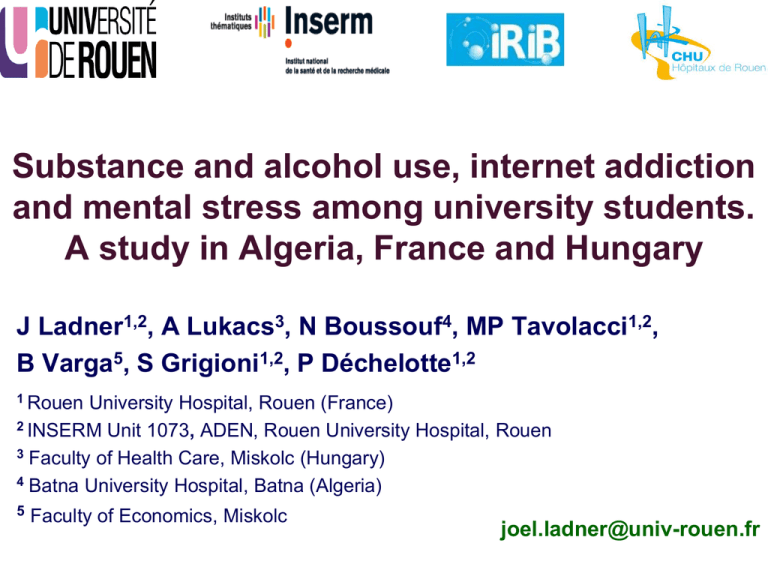
Substance and alcohol use, internet addiction
and mental stress among university students.
A study in Algeria, France and Hungary
J Ladner1,2, A Lukacs3, N Boussouf4, MP Tavolacci1,2,
B Varga5, S Grigioni1,2, P Déchelotte1,2
1 Rouen
University Hospital, Rouen (France)
2 INSERM Unit 1073, ADEN, Rouen University Hospital, Rouen
3 Faculty of Health Care, Miskolc (Hungary)
4 Batna University Hospital, Batna (Algeria)
5
Faculty of Economics, Miskolc
joel.ladner@univ-rouen.fr
Background
• Alcohol, tobacco and cannabis consumption are
well recognized as important public health topics in
university students
• Prevalence of Internet addiction, mental stress and
eating and disorders are regularly growing
Objectives
To study the prevalence and identify risk comportments
of alcohol, tobacco and cannabis use, Internet
addiction and eating disorders risks, perceived
mental stress in students in higher education in 3
countries (Algeria, France and Hungary)
Methods (1)
Batna, Algeria
Miskolc, Hungary
Rouen, France
Methods (2)
Questionnaire
• Anonymous auto-questionnaires
• Papers questionnaires in Batna and Miskolc
• Paper and online questionnaires in Rouen
(www.tasanteenunclic.org)
www.tasanteenunclic.org
Methods (3)
Data collection
•
•
•
•
•
Age, gender, to get a job in parallel, study grant holder)
Alcohol consumption (binge drinking)
Smoking habits
Cannabis experimentation
Psychotropic drugs consumption (anxiolytics,
antidepressant drugs)
• SCOFF questionnaire: screening test of eating disorders
risk
Methods (3)
The Perceived Stress Scale (PPS) of Cohen
• Assess global perception of stress
• 10 questions, 5-Lickert scale
• PPS score ranges from 0 to 40
Methods (4)
The Internet Stress Scale (Orman test)
• 9 questions, scored 0 or 1
• Measure the risk to become Net addicted
• Three levels of Internet addiction
– From 0 to 3: very little tendancy to become Net
addicted (low risk)
– From 4 to 6: a risk to become Net addicted (risk)
– From 7 to 9: a high risk to become Net addicted
(high risk)
Results (1)
A total of 2,102 students included
Batna
Miskolc
Rouen
p
Number
345
275
1,482
-
Sexe ratio M:F
0.20
0.14
0.60
0.02
Mean age (SD)
21.2 (4.8)
21.6 (4.3)
21.2 (8.5)
0.66
Living in couples %
5.0
27.3
17.2
<10-4
Get a job %
8.1
20.4
24.5
0.02
Study grant holder %
83.3
48.5
27.4
<10-4
SD: standard deviation
Results (2)
Smoking prevalence and cannabis experimentation
Batna
(n=345)
Miskolc
(n=275)
Rouen
(n=1,482)
p
Smokers %
4.2
21.5
26.9
0.03
Intend to stop smoking %
35.7
70.7
48.4
<10-4
6.7 (3.7, 1-30)
7.8 (5.2, 1-30)
6.0 (5.7, 1-20)
0.52
2.5
15.4
46.3
<10-4
1.2 (2.1, 0-8)
2.0 (2.0, 1-5)
10.5 (47.4, 0104)
0.02
Tobacco
Mean number of
cigarettes/day (SD, R)
Cannabis
Experimentation %
Mean number in the last
12 months (SD, R)
SD: standard deviation; R=range
Results (3)
Alcohol consumption in men and women (%)
Batna
(n=345)
Miskolc
(n=275)
Rouen
(n=1,482)
M
W
p
M
W
p
M
W
p
0
0
-
27.6
3.8
0.025
32.3
32.9
0.93
Never BG
93.6
100
0.45
15.7
39.3
<10-4
12.6
34.0
<10-4
At least 1 BG in
the last month
6.4
0
0.78
38.2
8.2
<10-4
41.3
12.6
<10-4
At least >1
drunkeness in the
last 12 months
2.7
0
0.89
82.3
56.7
0.01
82.9
37.8
0.001
Alcohol consumption
>2 x/week
BG: binge drinking
Results (4)
Risk of eating disorders
Batna
Miskolc
Rouen
p
Prevalence %
8.1
28.3
22.4
<10-4
Sexe ratio M:F
0.16
0.12
0.20
0.11
Results (5)
Perceived mental stress (mean value)
Men
Women
p=0.001
Rouen
p=0.36
Miskolc
p=0.28
Batna
0
5
10
15
20
25
30
35
40
Results (6)
Psychotropic drugs consumption (%)
Batna
(n=345)
M
W
Miskolc
(n=275)
p
Anxiolytic
dugs
2.0
10.2 <10-4
Antidepressant
drugs
1.1
3.9
0.01
Rouen
(n=1,482)
M
W
p
M
W
p
2.9
4.2
0.46
1.3
5.7
0.13
0
3.4
0.50
1.3
1.4
0.98
Results (7)
Prevalence of risk of Internet addiction (%)
Batna
(n=345)
M
W
Low risk
48.7
Medium risk
High risk
Miskolc
(n=275)
p
M
W
52.5
73.5
81.3
26.6
30.8 0.08
11.8
10.0
24.7
16.7
14.7
8.7
Rouen
(n=1,482)
p
0.07
M
W
62.5
71.2
31.0
25.5
6.5
3.3
p
0,001
Conclusion (1)
• Main findings
– Higher prevalence of smoking in French and Hungarian students
– As well as cannabis consumption in French students (around 50%)
– High level of alcohol consumption in French men and women
students
– Difference of alcohol consumption between men and women in
Hungarian students
– Very high level of stress in Hungarian students
– Very high risk of cyberaddiction in Algerian students; in women, the
risk remains significant in the 3 populations
Conclusion (2)
• New problematic and comportments
• Difference of substances use et risk comportments
between men and women
• These findings stress the need to develop investigations on
these topics in students population, to have a better
understanding
• There is also an urgent need for public health practitioners
and clinicians working in university campuses
• New research areas needed, especially the impact of these
risk behaviours on the professional career and future life
Results (7)
Risks of Internet addiction
Mean age (SD)
Students in couple
Get a job
Smoker
Cannabis experimentation
Never alcohol consumed
At least 1 binge drinking
Bad quality of sleep
Anxiolytics consumption
Risk of eating disorders
Stress quartile
Q1
Q2
Q3
Q4
High + risk
20.8 (6.1)
12.4
23.2
28.7
48.6
15.7
58.9
48.0
9.2
32.5
17.4
28.0
23.0
31.6
Low risk
p
21.5 (16.8) 0.001
19.5
0.001
25.3
0.38
25.4
0.30
42.3
0.02
17.3
0.09
41.7
0.001
42.0
0.05
6.5
0.06
19.6
<10-4
29.3
29.4
23.1
18.1
<10-4
Results (8)
Factors associated to Internet addiction (logistic regression)
OR
95% CI
p
Age
0.94
0.89-0.98 0.005
Men
3.08
2.16-4.89
<10-4
Cannabis experimentation
1.36
1.03-1.79
0.03
Stress quartiles
Q2
Q3
Q4
1.75
1.84
2.75
1.22-2.52 0.002
1.24-2.72 0.002
1.81-4.17 <10-4
Risk of eating disorder
1.64
1.21-2.23
0.03
Adjusted on sex, marital status, binge drinking, anxiolytics drug consumption, sleep quality


